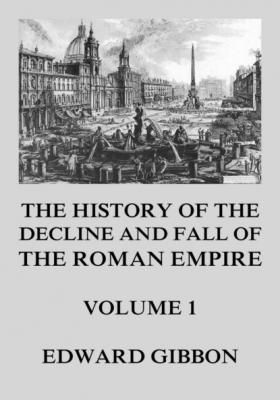The History of the Decline and Fall of the Roman Empire. Эдвард Гиббон
Читать онлайн.| Название | The History of the Decline and Fall of the Roman Empire |
|---|---|
| Автор произведения | Эдвард Гиббон |
| Жанр | Документальная литература |
| Серия | The History of the Decline and Fall of the Roman Empire |
| Издательство | Документальная литература |
| Год выпуска | 0 |
| isbn | 9783849658526 |
Footnotes:
Ref. 041
Dion Cassius (l. liv. p. 736 ) with the annotations of Reimar, who has collected all that Roman vanity has left upon the subject. The marble of Ancyra, on which Augustus recorded his own exploits, asserts that he compelled the Parthians to restore the ensigns of Crassus.
Ref. 042
Strabo (l. xvi. p. 780), Pliny the elder (Hist. Natur. l. vi. 32, 35 [28, 29]) and Dion Cassius (l. liii. p. 723 , and l. liv. p. 734 ) have left us very curious details concerning these wars. The Romans made themselves masters of Mariaba, or Merab, a city of Arabia Felix, well known to the Orientals (see Abulfeda and the Nubian geography, p. 52). They were arrived within three days’ journey of the Spice country, the rich object of their invasion. [See Mommsen, Römische Geschichte, v. p. 608 sqq.]
Ref. 043
By the slaughter of Varus and his three legions. See the first book of the Annals of Tacitus. Sueton. in August. c. 23, and Velleius Paterculus, l. ii. c. 117, &c. Augustus did not receive the melancholy news with all the temper and firmness that might have been expected from his character.
Ref. 044
Tacit. Annal. l. ii. [i. 11]. Dion Cassius, l. lvi. p. 832 , and the speech of Augustus himself, in Julian’s Cæsars. It receives great light from the learned notes of his French translator, M. Spanheim.
Ref. 045
Germanicus, Suetonius Paulinus, and Agricola were checked and recalled in the course of their victories. Corbulo was put to death. Military merit, as it is admirably expressed by Tacitus, was, in the strictest sense of the word, imperatoria virtus.
Ref. 046
Cæsar himself conceals that ignoble motive; but it is mentioned by Suetonius, c. 47. The British pearls proved, however, of little value, on account of their dark and livid colour. Tacitus observes, with reason (in Agricola, c. 12), that it was an inherent defect. “Ego facilius crediderim, naturam margaritis deesse quam nobis avaritiam.”
Ref. 047
Claudius, Nero, and Domitian. A hope is expressed by Pomponius Mela, l. iii. c. 6 (he wrote under Claudius), that, by the success of the Roman arms, the island and its savage inhabitants would soon be better known. It is amusing enough to peruse such passages in the midst of London.
Ref. 048
See the admirable abridgment, given by Tacitus, in the Life of Agricola, and copiously, though perhaps not completely, illustrated by our own antiquarians, Camden and Horsley. [See Appendix 2.]
Ref. 049
[There is no good ground for the identification of mons Graupius with the Grampian hills. The date of the battle was 84 or 85 ad; the place is quite uncertain.]
Ref. 050
The Irish writers, jealous of their national honour, are extremely provoked on this occasion, both with Tacitus and with Agricola. [Agricola’s design was not carried out because Domitian refused to send the additional legion.]
Ref. 051
See Horsley’s Britannia Romana, l. i. c. 10.
Ref. 052
The poet Buchanan celebrates, with elegance and spirit (see his Sylvæ, v.), the unviolated independence of his native country. But, if the single testimony of Richard of Cirencester was sufficient to create a Roman province of Vespasiana to the north of the wall, that independence would be reduced within very narrow limits.
Ref. 053
See Appian (in Prooem. ) and the uniform imagery of Ossian’s poems, which, according to every hypothesis, were composed by a native Caledonian.
Ref. 054
See Pliny’s Panegyric, which seems founded on facts.
Ref. 055
Dion Cassius, l. lxvii. [6 et sqq.].
Ref. 056
Herodotus, l. iv. c. 94. Julian in the Cæsars, with Spanheim’s observations.
Ref. 057
Plin. Epist. viii. 9.
Ref. 058
Dion Cassius, l. lxviii. p. 1123, 1131 [6 and 14]. Julian. in Cæsaribus. Eutropius, viii. 2, 6. Aurelius Victor in Epitome. [See Appendix 3.]
Ref. 059
See a Memoir of M. d’Anville, on the Province of Dacia, in the Académie des Inscriptions, tom. xxviii. p. 444-468. [The region east of the Aluta, corresponding to the modern Walachia, was not included in Dacia, but went with the province of Lower Mœsia. See Domaszewski, Epigr. Mittheilungen, xiii. p. 137. The limits of Dacia are incorrect in the map in this volume. They should follow the line of the Carpathians in the south-east and east, excluding Walachia and Moldavia.]
Ref. 060
Trajan’s sentiments are represented in a very just and lively manner in the Cæsars of Julian. [The date of the beginning of the Parthian War is 114 ad]
Ref. 061
Eutropius and Sextus Rufus have endeavoured to perpetuate the illusion. See a very sensible dissertation of M. Freret, in the Académie des Inscriptions, tom. xxi. p. 55.
Ref. 062
Dion Cassius, l. lxviii. [18 et sqq.]; and the Abbreviators.
Ref. 063
[117 ad A triumph in honour of this eastern expedition was celebrated after the emperor’s death. On inscriptions he is called Divus Traianus Parthicus, instead of Divus Traianus (Schiller, Gesch. der röm. Kaiser zeit, i. 563).]
Ref. 064
Ovid Fast. l. ii. ver. 667. See Livy [i. 55], and Dionysius of Halicarnassus, under the reign of Tarquin.
Ref. 065
St. Augustin is highly delighted with the proof of the weakness of Terminus, and the vanity of the Augurs. See De Civitate Dei, iv. 29. [The loss of trans-Rhenane Germany was a previous instance of the retreat of Terminus.]
Ref. 066
See the Augustan History, p. 5 [i.
